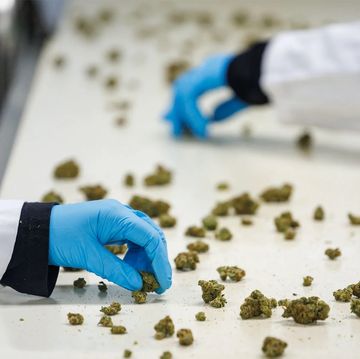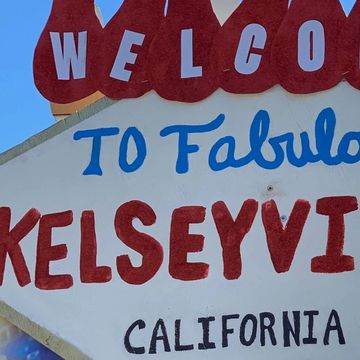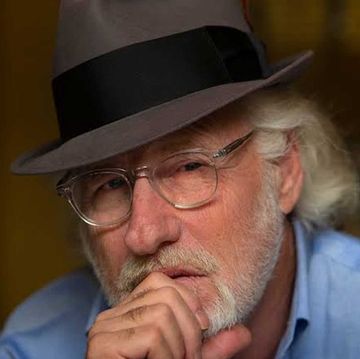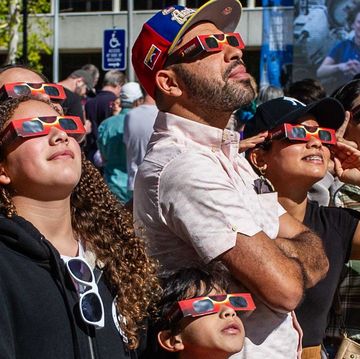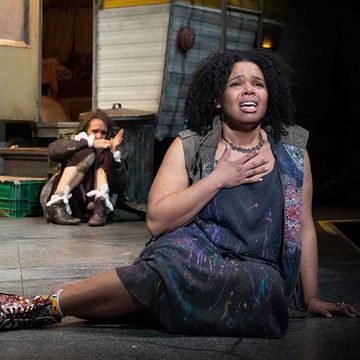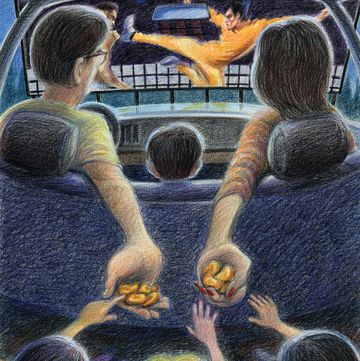Life in California is full of vexing questions. Can you end a friendship with someone who preordered a Tesla Cybertruck? Are we finally allowed to water our lawns? How does the governor get his teeth so white?
Alta Journal has enlisted two experts to answer all of your questions: Italian greyhound–warmer Stacey Grenrock Woods and Orange County partisan Gustavo Arellano, both of whom bring decades of hard-won knowledge and laser-sharp insights into the Golden State.
Have a question of your own? Ask a Californian!
I hear a lot of people lately identifying themselves as “California sober.” Is there some new kind of sobriety now? Did they change it?
—MicroCurious
Stacey: “California sober” is an intoxication model that typically shuns hard liquor and rough drugs in favor of marijuana, psychedelics, mellow-looking wines, harmonically vibrating beers, and even ayahuasca, if you have any. Essentially, being California sober means being pretty high.
A lot of people will tell you that if you have a problem with alcohol, you should switch to drugs! Complete abstinence, they say, as you’re taking them to the ATM, isn’t the only way to be sober. Even the most temperate housewife magazines suggest you “talk to your budtender about your goals” when deciding “if California sober is right for you.” Don’t bother. Your budtender already knows your goals. Just because he rings you up on an iPad and your grandparents are in line behind you doesn’t make what’s happening any different.
I know what you’re probably thinking, Curious. You’re thinking, Lay off, Sergeant Square! Don’t harsh everyone’s mellow! I’m not looking to harsh mellows. It’s just that there’s no alternative way to be sober. (Sorry. My advice column, my rules.) People who write themselves prescriptions like “One microdose of LSD a day plus five cannabis joints as needed” tend to be pretty loose with the “as needed” part. It makes you wonder why they even have their own prescription pad to begin with. In other words, if your best idea to get a monkey off your back is to put it in a Monkey Bjorn and swing it around to the front where you can keep an eye on it, maybe only “sober-sober” is right for you. If your drinking is a problem (and if you can apply the phrase “your drinking” to it, it probably is), then buying into California sober is about as wise as buying into Florida swampland. But whatever you do, don’t forget: the first one’s free.
Gustavo: My dad has been alcohol-free for 41 years, and a good friend is about 100 days in, so sobriety is no laughing matter for me…unless it’s this “California sober” malarkey. If you are truly an addict, using other substances is like living in Poway—why? Channel your need for a crutch into something productive, like trying to solve climate change or figuring out what exactly California’s lieutenant governor does except run for higher office.
I love shopping at the thrift stores of my hometown of Arcadia, but more and more, I notice groups of people swooping in and snagging loads of clothes to sell on the internet. There’s nothing left for me! Can I say something to someone?
—Just for Personal Use
Stacey: Well, isn’t that just the irony of our age: there’s finally an abundance of cool things, but greed has rendered them unattainable by the very people who made them cool. I call it the Gen Xer’s Lament, but really, no generation is exempt from it. If you’re far enough ahead of the curve to be noticed, you’ll be swiftly relegated to the tail end of the curve by people who, uncool as they are, have stronger drives and bigger cars, get up earlier, and are willing to go to Arcadia.
Should you say something to someone? Let’s think what that would look like for a minute, Personal: “Hi, small-business owner, will you make a policy that results in many fewer sales so that I, a cool person, can buy the two things I want?” And while you pause for the long, perplexed stare that follows, you can add questions like “Don’t you want cool people in your store?” and “Does my coolness mean nothing to you?”
I advise you to lose your taste for vintage clothes. Let the sheep get up early and schlep loads of smelly rags to and from the Rose Bowl every weekend while you fashion yourself a nice uniform of Amazon Basics: tops and bottoms in a calming institutional gray to wear day in and day out. Think the simplicity of Albert Einstein meets the functionality of Rocky Balboa. No one will try to bite that style, but if they do, we will be one step closer to fashion utopia, where everyone is equal and everything’s machine washable.
Gustavo: Sorry, but when I hear “groups of people swooping in and snagging loads of clothes,” I ain’t thinking about thrifters; I’m thinking flash mobs that rob. You’ve heard about them, right? Local TV stations from San Francisco to Southern California air TikToks and security camera footage of ransacked CVSes, Targets, and shoe warehouses all the time. I wish it was more lies by the lazy media, but rampant shoplifting is a thing. Los Angeles Police Department data crunched by the nonprofit newsroom Crosstown LA showed an 81 percent increase in shoplifting reports filed from the previous year. (San Francisco, ever trying to beat L.A., reported a 35 percent drop in retail theft in the first half of 2023 compared with 2022. Show-offs.)
You can go on social media and blame Newsom and liberals and progressive DAs for the rise in thefts, but you might as well do it from Idaho at this point. Robbery, sadly, is a California original sin that we just can’t quit. How do you think Spaniards built the missions? The Big Four got their railroads? The Dodgers, Dodger Stadium? Santa Clara, the 49ers? Sorry I got all pessimistic. Next time you’re in the middle of a flash rob, or at the Salvation Army shop, yell, “John Sutter! John Sutter!” That might just stun the wannabe Valjeans long enough for security guards to do their damn jobs—or for you to nab that tattered Burberry coat.
What’s the correct protocol when you notice that one of your friends has had “something” done? Are you supposed to pretend like you don’t notice, or is it like a haircut?
—Filled with Questions
Stacey: Do you mention when someone gets a haircut? I guess you’re not afraid of getting sued.
Obviously, Filled, you have to pretend you don’t notice. After you’ve done your best to covertly assess the alterations for later comparison with old photos, simply put the matter out of your mind and concentrate on other things, like how much this whole thing has ruined your lunch. Then fix your gaze off somewhere just beyond the theater of conflict.
The only way this topic is freed for discussion is if the injectee brings it up, and the best way to force them to do that is to behave as if your dining companion has something in their teeth or something on their face: send a bunch of pointed telepathic communications brimming with panic and embarrassment and shift nervously in your chair while you dart your eyes all around until they confess. Then, and only then, is it OK to sigh heavily, but don’t actually say, “Thank God you said something. I was dying over here!” Instead, feign mild surprise as you say, “Gosh, it’s amazing what they can do these days!” And before you part ways to go home and recuperate, be sure you ask them exactly what they had done and how long it lasts so you can factor that in if you’re forced to make future plans.
Gustavo: Ah, the true class divide of California! When a wife of a friend recently, excitedly announced she was getting a “mommy lift”—which I’m assuming is a tummy tuck and breast augmentation because she rubbed her panza and grabbed her chichis while talking about it—she was the first person I’ve personally known to desire any sort of plastic surgery. I smiled and nodded my head, even though I felt sad knowing she didn’t think she was beautiful enough. I was even sadder that she was now in a different social stratum, where the answer to body insecurities is a staycation in Newport Beach and not a Planet Fitness membership. We of working-class stock like to age like a fine Paso Robles cab, even if the results come off more like a Temecula merlot.
But plastic surgeries should always be about the person getting them, just like a haircut. It’s not about how you feel, no matter how inflated the lips or fucked-up the new hairline. So say nothing unless the recipient does, smile and nod your head if that happens, and be prepared for the next procedure—because if there’s anything I’ve learned from the Real Housewives franchise, one is never enough.
Gustavo Arellano is the author of Orange County: A Personal History and Taco USA: How Mexican Food Conquered America. In 2025, Arellano was named a Pulitzer Prize finalist for his work as a columnist for the Los Angeles Times. He was formerly editor of OC Weekly, an alternative newspaper in Orange County, California, and penned the award-winning ¡Ask a Mexican!, a nationally syndicated column in which he answered any and all questions about America’s spiciest and largest minority. Arellano is the recipient of awards ranging from the Association of Alternative Newsweeklies Best Columnist to the Los Angeles Press Club President’s Award to an Impact Award from the National Hispanic Media Coalition, and he was recognized by the California Latino Legislative Caucus with a 2008 Spirit Award for his “exceptional vision, creativity, and work ethic.” Arellano is a lifelong resident of Orange County and is the proud son of two Mexican immigrants, one of whom came to this country in the trunk of a Chevy.
Stacey Grenrock Woods is a regular contributor to Esquire and a former correspondent for The Daily Show with Jon Stewart. She writes and consults on various TV shows, and has a recurring role as Tricia Thoon on Fox’s Arrested Development. Her first book is I, California.


